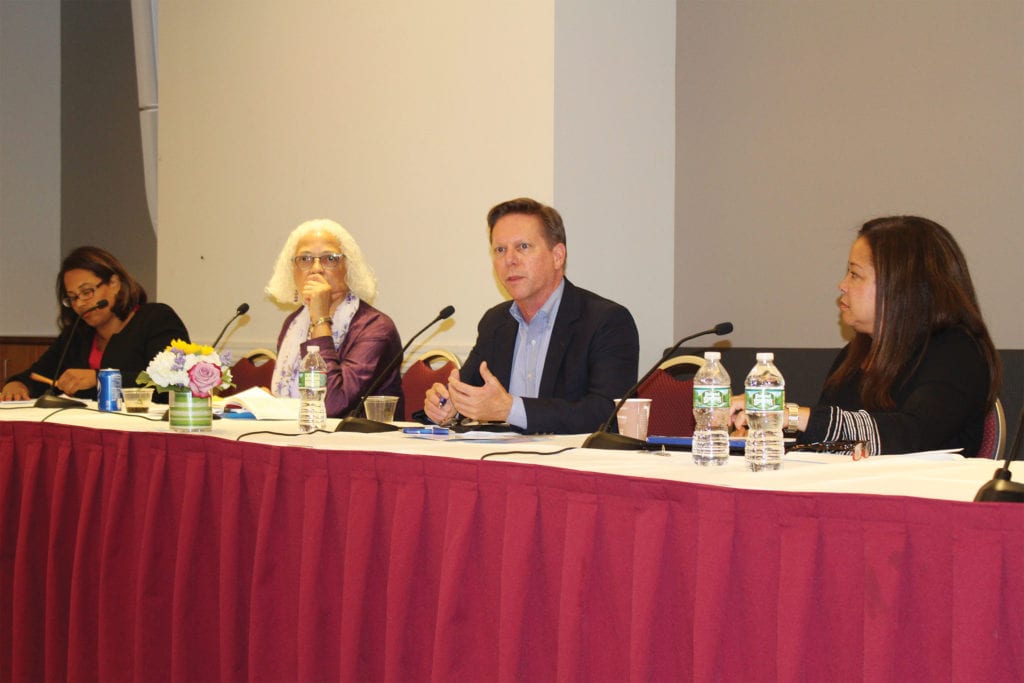Race-based admissions necessary to diversify schools
Panel supports affirmative action to tackle resegregation of Boston’s schools

Lawyers and civil rights advocates met last Thursday to discuss diversity in the education system and solutions to educational inequity, at Suffolk University Law School.
The panel, organized by the Lawyers’ Committee for Civil Rights and Economic Justice, included Oren Sellstrom, litigation director for the Lawyers’ Committee, Tanisha Sullivan, president of the Boston branch of the NAACP, and professors Kim McLaurin and Renee Landers from Suffolk University Law School. Before an audience of about 30 students, professors and community members, the group explored the ways in which diversity in higher education is being challenged and offered potential solutions to tackling this assault.
“When it comes to racial and ethnic diversity, we have to be more intentional and not be afraid to talk about race in a healthy way,” said Sullivan, and that was exactly what the panel, arranged as part of the Lawyer’s Committee’s 50th anniversary celebrations, did that afternoon during their discussion, titled “The Future of Community Representation When Diversity Is Under Attack.”
In her opening remarks, McLaurin let statistics build the case for diversity under attack. According to a report by the Boston Globe released in early August, 60 percent of Boston Public Schools are now considered intensely segregated, a shocking number that has steadily increased from 42 percent over the past 20 years.
“It happened on our watch,” said McLaurin of apparent school resegregation, “and it happened after a lot of trauma for Boston,” referring to school desegregation and the implementation of mandatory busing in the 1970s. Boston’s reputation is still tainted by this legacy, she said.
Talk swiftly turned to the issue of race-based affirmative action in admissions, which the panel unanimously supported.
Calling education equity a “cornerstone of the civil rights movement,” Sellstrom said it is necessary and fair to consider race and ethnic background when evaluating applicants.
“[Students] should be allowed to talk about their whole selves, to talk about themselves in a holistic manner so that people are not reduced to test scores,” said Sellstrom.
He is currently defending students’ rights in the ongoing lawsuit against Harvard University’s use of race in admissions criteria for Asian American students. The case, filed by Ed Blum, who previously tried and failed to dismantle affirmative action in admissions at the University of North Carolina, is due to be heard in federal district court this fall. Sellstrom said it is a “nefarious proceeding,” noting that the lawsuit was not filed by the students impacted, and that Blum intends to use the case to divide racial groups on this issue.
Race-based admissions policies also ensure that schools produce a diverse workforce, one that the increasingly global market demands, said McLaurin. “If students and the workforce cannot adapt to [a global market] other countries who have gotten it right will overtake us, and will do it better and will do it more broadly than United States citizens will.”
A recent poll conducted by Suffolk University and published by WGBH said that 86 percent of respondents believe racial and ethnic diversity is important in higher education, while 72 percent were against the implementation of race-based admissions.
“How do you reconcile that?” said Sullivan. “This shows that when it comes to doing the things that are necessary to secure diversity … as a society we’re really not supportive of race being a factor.”
“This is something we have to wrestle with,” she said.
Meanwhile, society suffers. “I think there’s a lack of understanding,” said McLaurin, “of how deeply a lack of diversity hurts everyone. It isn’t just one group or a few groups–my white students suffer when there is not diversity in that classroom.”


![Banner [Virtual] Art Gallery](https://baystatebanner.com/wp-content/uploads/2024/04/Cagen-Luse_Men-at-store-e1713991226112-150x150.jpg)



